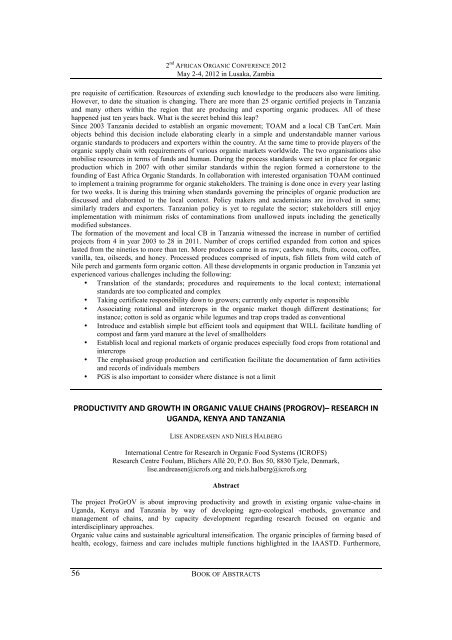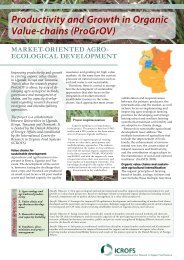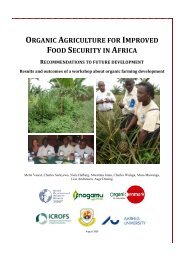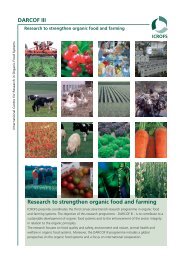The 2nd African Organic Conference â Mainstreaming ... - ICROFS
The 2nd African Organic Conference â Mainstreaming ... - ICROFS
The 2nd African Organic Conference â Mainstreaming ... - ICROFS
You also want an ePaper? Increase the reach of your titles
YUMPU automatically turns print PDFs into web optimized ePapers that Google loves.
2 nd AFRICAN ORGANIC CONFERENCE 2012<br />
May 2-4, 2012 in Lusaka, Zambia<br />
pre requisite of certification. Resources of extending such knowledge to the producers also were limiting.<br />
However, to date the situation is changing. <strong>The</strong>re are more than 25 organic certified projects in Tanzania<br />
and many others within the region that are producing and exporting organic produces. All of these<br />
happened just ten years back. What is the secret behind this leap?<br />
Since 2003 Tanzania decided to establish an organic movement; TOAM and a local CB TanCert. Main<br />
objects behind this decision include elaborating clearly in a simple and understandable manner various<br />
organic standards to producers and exporters within the country. At the same time to provide players of the<br />
organic supply chain with requirements of various organic markets worldwide. <strong>The</strong> two organisations also<br />
mobilise resources in terms of funds and human. During the process standards were set in place for organic<br />
production which in 2007 with other similar standards within the region formed a cornerstone to the<br />
founding of East Africa <strong>Organic</strong> Standards. In collaboration with interested organisation TOAM continued<br />
to implement a training programme for organic stakeholders. <strong>The</strong> training is done once in every year lasting<br />
for two weeks. It is during this training when standards governing the principles of organic production are<br />
discussed and elaborated to the local context. Policy makers and academicians are involved in same;<br />
similarly traders and exporters. Tanzanian policy is yet to regulate the sector; stakeholders still enjoy<br />
implementation with minimum risks of contaminations from unallowed inputs including the genetically<br />
modified substances.<br />
<strong>The</strong> formation of the movement and local CB in Tanzania witnessed the increase in number of certified<br />
projects from 4 in year 2003 to 28 in 2011. Number of crops certified expanded from cotton and spices<br />
lasted from the nineties to more than ten. More produces came in as raw; cashew nuts, fruits, cocoa, coffee,<br />
vanilla, tea, oilseeds, and honey. Processed produces comprised of inputs, fish fillets from wild catch of<br />
Nile perch and garments form organic cotton. All these developments in organic production in Tanzania yet<br />
experienced various challenges including the following:<br />
• Translation of the standards; procedures and requirements to the local context; international<br />
standards are too complicated and complex<br />
• Taking certificate responsibility down to growers; currently only exporter is responsible<br />
• Associating rotational and intercrops in the organic market though different destinations; for<br />
instance; cotton is sold as organic while legumes and trap crops traded as conventional<br />
• Introduce and establish simple but efficient tools and equipment that WILL facilitate handling of<br />
compost and farm yard manure at the level of smallholders<br />
• Establish local and regional markets of organic produces especially food crops from rotational and<br />
intercrops<br />
• <strong>The</strong> emphasised group production and certification facilitate the documentation of farm activities<br />
and records of individuals members<br />
• PGS is also important to consider where distance is not a limit<br />
PRODUCTIVITY&AND&GROWTH&IN&ORGANIC&VALUE&CHAINS&(PROGROV)–&RESEARCH&IN&<br />
UGANDA,&KENYA&AND&TANZANIA&<br />
LISE ANDREASEN AND NIELS HALBERG<br />
International Centre for Research in <strong>Organic</strong> Food Systems (<strong>ICROFS</strong>)<br />
Research Centre Foulum, Blichers Allé 20, P.O. Box 50, 8830 Tjele, Denmark,<br />
lise.andreasen@icrofs.org and niels.halberg@icrofs.org<br />
Abstract<br />
<strong>The</strong> project ProGrOV is about improving productivity and growth in existing organic value-chains in<br />
Uganda, Kenya and Tanzania by way of developing agro-ecological -methods, governance and<br />
management of chains, and by capacity development regarding research focused on organic and<br />
interdisciplinary approaches.<br />
<strong>Organic</strong> value cains and sustainable agricultural intensification. <strong>The</strong> organic principles of farming based of<br />
health, ecology, fairness and care includes multiple functions highlighted in the IAASTD. Furthermore,<br />
56<br />
BOOK OF ABSTRACTS





